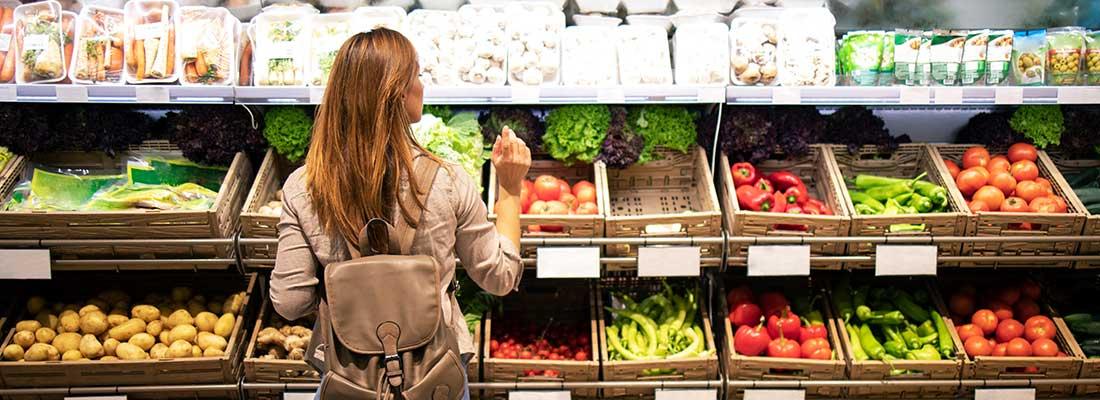Food, Global Health Reading time 3 min
Harmonizing Environmental Labelling in Europe: An Ambition for Sustainable Food
Published on 23 January 2025

From farm to fork, the European food system puts significant pressure on the environment: greenhouse gas emissions, intensive use of chemicals, water and soil pollution, and massive waste production. These environmental impacts are closely linked to public health issues, as nearly half of European adults are overweight. Informing consumers about the sustainability of food products is an essential lever for encouraging more responsible eating habits and reducing the sector’s environmental footprint. In this context, the ECO FOOD CHOICE project, funded by the European Union's LIFE program, promotes the sharing of knowledge and experiences at the EU level. Its goal is to develop and test new methodologies for life cycle inventories, environmental scores for food, and a labelling system to drive deep changes in both agricultural production chains and consumer behaviours.
Transforming the European Food System through Harmonized Data and Environmental Labels
Facing the urgency of the ecological transition, the ECO FOOD CHOICE project tackles a critical issue: how can European consumers be provided with reliable and harmonized information on the environmental impact of food products to promote healthy and sustainable choices? The project aligns with the priorities of the European Green Deal and the Farm to Fork strategy. It aims to develop databases and innovative methods to assess the environmental impacts of food and translate them into accessible environmental scores through clear and consistent labelling.
The project's general objectives include:
- Developing harmonized methodologies for food life cycle inventories in Europe, with guidelines for adapting indicators to different national or regional contexts.
- Developing an environmental score (E-score) that integrates indicators from life cycle analyses (LCA) to enable reliable comparisons between products.
- Designing and validating environmental labels tested under real-life conditions in France, Germany, the Netherlands, and Spain, with 56,000 European consumers in supermarkets, canteens, and laboratories.
The actions carried out within ECO FOOD CHOICE project address various needs, such as harmonizing practices between countries, improving national databases, and strengthening consumer trust. They also aim to support European public policies by providing concrete feedback and transferable methodologies.
In France, for example, the experience gained with the Agribalyse database will be shared to enrich the approaches of other countries, while in Germany, the project will help structure databases and labels to meet growing demands for transparency. In the Netherlands, the project will leverage voluntary initiatives from large companies, and in Spain, it will feed into ongoing work driven by increasing interest from government ministries and consumers.
With its methodological and transnational scope, ECO FOOD CHOICE aims to lay the foundation for sustainable food at the European level, with the goal of transforming consumption habits to preserve the environment while enhancing the health of European citizens.
Expertise Mobilized to Test Environmental Labeling in Real-Life Conditions
Researchers from three INRAE laboratories (GAEL, PSAE, and ITAP) bring their expertise to the project, particularly for activities aimed at validating environmental labelling under real-world conditions. This work follows a rigorous approach that combines laboratory experiments and real-world tests. INRAE also contributes to the development of a harmonized methodology for calculating an environmental score (E-score) based on LCA data. This initiative seeks to make the assessment accessible and understandable for consumers while providing tools for producers to highlight their sustainability efforts.
In France, pilot experiments in canteens offer the opportunity to assess the impact of environmental labelling on consumer food choices in a collective setting. These tests explore different contexts from those observed in supermarkets or online, thanks to PSAE's expertise in evaluating environmental policies applied to collective catering. Additionally, the methodologies developed by GAEL in the field of experimental economics allow for analysing consumer behaviours when confronted with new information, using tools such as a dedicated application and an experimental grocery store.
The ITAP team contributes its expertise in environmental assessment, particularly through life cycle analysis, to develop operational methods that capture the complexity of food systems. This approach helps create relevant indicators for labelling while ensuring a solid scientific basis for informing consumers.
These research efforts, directly linked to sustainability and ecological transition challenges, enhance the relevance of the methodologies developed within ECO FOOD CHOICE project and anticipate the conditions for their broader adoption in Europe.
The LIFE Programme: A Lever for Environmental Innovation
A financial instrument of the European Commission, the LIFE programme supports innovative projects, both public and private, in the fields of environment and climate. For the period 2021-2027, it has a budget of €5.4 billion distributed across four axes: Nature and Biodiversity, Circular Economy and Quality of Life, Climate Change Mitigation and Adaptation, and Clean Energy Transition. LIFE supports the transition toward a sustainable and carbon-neutral economy while protecting and restoring European biodiversity and ecosystems.
The ECO FOOD CHOICE project was selected under the LIFE 2022 Environmental Governance call.
>> Learn more about the LIFE programme
